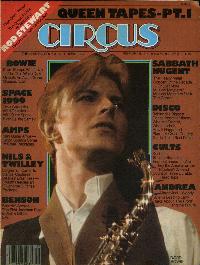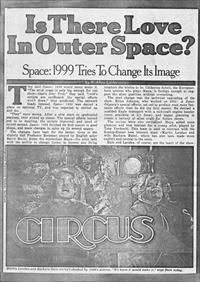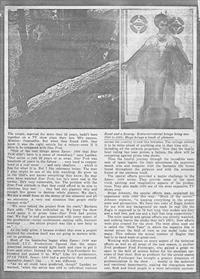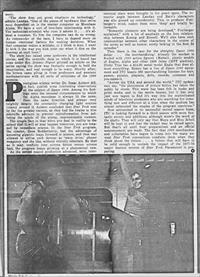Criticism
Is There Love In Outer Space?

By R. Allen Leider



Circus, February 28, 1977 No 130 p37-39
Circus was an American rock magazine published from 1966 (as "Hullabaloo", becoming "Circus" in 1969) to 2006.
They said Space: 1999 would never make it. "The sci-fi craze is only big enough for one show - that's Star Trek," they said. "1999's scripts are cardboard, the special effects won't draw," they predicted. The network heads listened. Space: 1999 was denied a place on national TV, and was expected to shrivel up and die.
"They" were wrong. After a slow start on syndicated stations, 1999 picked up steam. The special effects turned out to be dazzling, the scripts improved, and word of mouth spread. Space: 1999 finished its first season in good shape, and made changes to spice up its second season.
The changes have been for the better. Gone is the slightly dull Professor Bergman played by English actor Barry Morse. Enter the mysterious Maya-the alien lady with the ability to change forms, to become any living creature she wishes to be. Catherine Schell, the European born actress who plays Maya, is foreign enough to suggest the alien qualities without overacting.
The next change was the technical upgrading of the show. Brian Johnson, who worked on 2001: A Space Odyssey's special effects, set out to produce even more fantastic effects than he did the first season. He devised a modified Eagle transport with a mid-craft engine booster (soon available in kit form) and began planning to create a battery of alien craft for future shows.
The scripts were also revitalized. Maya added some glamour and love interest for a young pilot, played by Tony Verdeschi. This team is used to contrast with the Koenig-Russel [sic] love interest team (Martin Landau and wife Barbara Bain), which has also been made more explicit and central to the story.
Bain and Landau, of course, are the heart of the show. The couple, married for more than 25 years, hadn't been together on a TV show since their late '60's success, Mission: Impossible. But when they found 1999, they knew it was the right vehicle for a return-even if it were to he compared with Star Trek.
"One of the best things about Space: 1999 that Star Trek didn't have is a sense of immediacy," says Landau. "Our series is just 25 years or so away. Star Trek was hundreds of years in the future ... very hard to comprehend in a real sense ... and very idealistic ... which is fine for what it is. But I like relevancy better. The man I play might be one of the kids watching. He grew up in the 1950s and knows everything they know. He may even have watched Star Trek, but he's more real to the viewer. He's very vulnerable, too. The problem with the Star Trek attitude is that they could afford to be nice to people they met ... they had this gigantic ship and enough fire power to destroy whole planets. We don't. We are a small force at the mercy of the elements and all we encounter. A very real situation that people really connect with."
"We were behind the project from the start," Barbara Bain adds. "The idea enthralled us. We knew the show could make it in prime time - Star Trek had proven that. We dug in and got acquainted with every aspect of the production- script conferences, casting calls, business meetings ... the entire project was like a new baby to us"
As the baby grew, it became evident that even a project destined for stardom itself was not going to mature without its problems.
Most of the headaches began when Space: 1999 was finished. I.T.C. Productions figured that the major American networks would fight tooth and claw to get it from each other. Instead the network Vice-Presidents ho-hummed and passed it by. Why? Like it's predecessor, Star Trek, Space: 1999 had a peculiarity that network mentality doesn't like - it was different.
"As we all could have predicted, though" Landau remarked, "when the series was sold to individual stations across the country it sold like hotcakes. The ratings showed it to be miles ahead of anything else in that time slot including all the network programs." Now that the family hour ruling has been proven a failure, the show will be competing against prime time shows.
Thus the fateful journey through the incredible vastness of space begins. On their adventures the explorers match wits and weapons with the fantastic life forms found throughout the galaxies and with the awesome forces of the universe itself.
The special effects provided a major challenge in the Space: 1999 series. They provide some of the most vivid, exciting and imaginative aspects of the productions. They also made 1999 one of the most expensive TV shows ever.
Brian Johnson, the special effects man, explained his experience with 1999 this way: "Much of .the secret" Johnson explains, "is keeping everything in the proper scale and perspective. We have two sizes of Eagle models for use with any background we need. In real life the Eagle is supposed to be 76 feet long. Our models are four and a half feet, and one and a half feet long respectively."
The colour quality and optical effects are strictly watched, and nothing leaves the studio that isn't 100%. New effects were also created for the show. The most often used one is called the "Held Take" in which the negative film is moved across the field of view so one model looks like many. This reduces the actual number of Eagles that had to be hand made at great cost.
Working with Johnson on every aspect of the technical effects as well as all areas of the new season, is ex-Star Trek producer Fred Freiberger, who gained a great respect in the field of science fiction for his excellent episodes of that show. Now as producer for the second season of 1999, Freiberger has brought a greater dimension of professionalism to the show ... mostly in the technical and emotional departments, making the characters more real, flesh and blood people in a more believable environment.
"The show does put great emphasis on technology," admits Landau. "One of the pieces of hardware that we're most dependent on is the master computer on Moonbase Alpha. We have a sort of love-hate relationship with it. The technician-scientist who runs it adores it ... it's almost a romance. To him the computer can do no wrong. As commander of the base, I have to depend more on human emotional factors for making decisions. When that computer makes a mistake, or I think it does, I want to kick it the way you kick your car when it dies on the freeway at rush hour."
The show has raised some eyebrows in the intellectual circles, and the scientific data on which it is based has come under fire. Science Digest printed an article on the series [here] saying the show was fantastic enough to hold the imagination, and real enough to be scary. Shortly after, the letters came piling in from professors and amateur mathematicians with all sorts of criticisms of the 1999 premise.
Prestigious science writer Dr. Isaac Asimov did, in fact, publish some interesting observations on the subject of Space: 1999 [here]. Among his findings were the unusual circumstances by which the Alpha moonbase is always lit the same, from the same direction and always very brightly despite the constantly changing light sources (stars) around it. Asimov concluded that Star Trek was by far the greater success, as they had the brains to hire scientific advisers to prevent misinformation from polluting the minds of the young, impressionable viewers.
The simple fact is that when you deal in reality to the extent that it will or may happen tomorrow, you are trapped by immediate science. In the Star Trek program, the creator, Gene Roddenberry, had the advantage of assuming gigantic leaps forward in science, and thus was allowed to utilize such devices as 'warp drive,' phaser weaponry and the like, without vitriolic rebuttals. Be that as it may; conflicts over science fiction versus science fact, the program keeps growing at a phenomenal rate.
As the season production advanced, more international stars were brought in for guest spots. The romantic angle between Landau and Bain's characters was also goosed up considerably. This, in producer Freiberger's mind, makes them more 'deep' and totally believable.
"Romantic elements are being developed," Freiberger explained," with a lot of emphasis on the love relationship between Koenig and Russell. We'll also have such relationships between other characters in the course of the series as well as humor, sorely lacking in the first 24 episodes."
Then there is the race for the almighty Space: 1999 dollar ... the merchandising! Already the market is flooded with 1999 action figures (Mattel), plastic models, of Eagles, Alpha and other 1999 items (MPF plastics), Dinky Toys has a $14.00 metal model Eagle that does almost everything. Remco has a line of Space: 1999 equipment and ITC boasts 200 merchandising licenses for toys, games, puzzles, playsets, dolls, records, costumes and you-name-it.
"Across the USA and around the world," ITC spokesmen say, "the phenomena of science fiction has taken the public by storm. This wave has been felt in books and print media and in the movie houses, but it has only just now begun to find it's way into the sophisticated minds of television producers who are searching for some thing new and different at a time when the medium has almost exhausted the staples of the program spectrum."
Now entrenched in its successful second season boom, ITC is looking forward to a third season with more fantastic events and additions, although mum's the word at the studio. They will only say that Maya and Miss Schell will be kept in and that the budget may be raised again. But that's all until final preparations and an official announcement are made. The fact that 1999 merchandise and collectibles have begun to creep into the many annual Star Trek conventions comforts them when they think about the future ... a future that will have to be solid enough to sustain the impact of the 1977-78 major feature version of Star Trek Paramount is preparing.
Space: 1999 copyright ITV Studios Global Entertainment